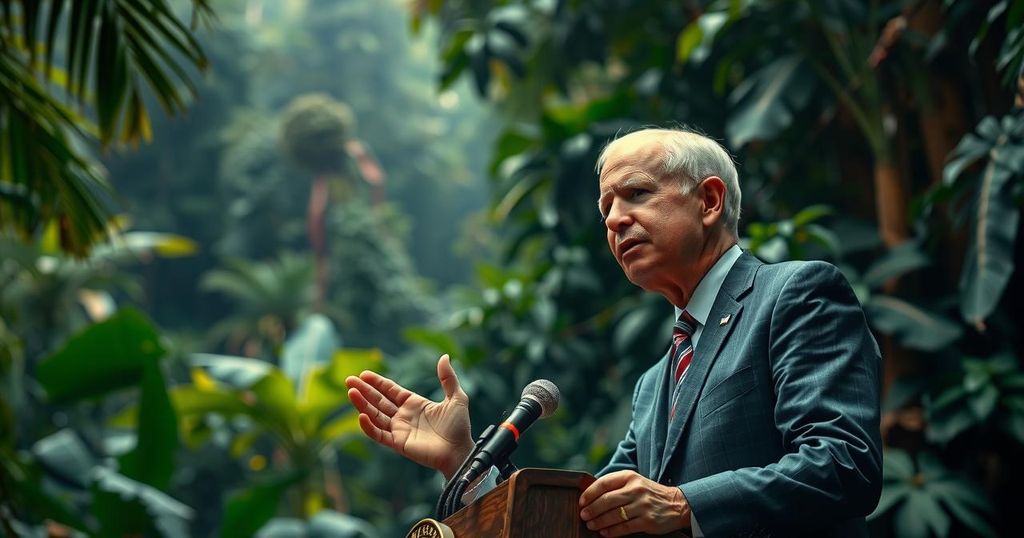Biden’s Historic Amazon Visit: A Commitment to Climate Action and Future Challenges

President Joe Biden’s historic visit to the Amazon rainforest marks his administration’s commitment to combating climate change, highlighting surpassing funding goals for international climate initiatives. He announced significant investments and engaged with Indigenous leaders, emphasizing the urgency of climate action. However, concerns loom over the potential scale back of climate efforts under the incoming Trump administration, with implications for future U.S. environmental policy and international cooperation in clean energy efforts.
On a historic trip to Brazil, President Joe Biden became the first sitting U.S. president to visit the Amazon rainforest, showcasing his administration’s commitment to combating climate change. Arriving in Manaus, he announced that the U.S. has exceeded its goal of providing $11 billion annually in international climate funding by 2024, which primarily benefits nations of the Global South in their climate initiatives. Biden emphasized the urgency of climate action, framing it as an existential struggle for humanity during remarks made at a nature reserve in the Amazon. During his visit, Biden unveiled further U.S. investments in environmental projects, including a substantial $50 million allocated to the Amazon Fund. He engaged with Indigenous leaders, toured the rainforest via helicopter, and witnessed the deteriorating condition of the jungle, which has suffered from increased deforestation and devastating fires. The Biden administration has framed these efforts as a significant economic opportunity that must be grasped both domestically and internationally. However, the upcoming transition in U.S. leadership raises concerns about the future of these initiatives, with some foreign diplomats fearing a withdrawal from active climate engagement under President-elect Donald Trump. Biden expressed hope that his successor will recognize the value of clean energy, stating, “the clean energy revolution that’s under way in America, but nobody, nobody can reverse it.” This highlights the ongoing competition in climate strategy between the U.S. and China, particularly as the latter leads in electric vehicle production. As Biden prepares for further discussions at the G20 summit, he will advocate for workers’ rights and economic growth that prioritizes sustainability. In response to inquiries regarding U.S. commitments to global partnerships on climate action, the White House indicated that the current administration will continue to focus on the achievements made over the past four years, leaving open the potential for future administrations to continue these efforts. Biden’s visit and announcements signify a pivotal moment for U.S. climate policy, potentially shaping future international cooperation against climate change amid concerns about the sustainability of U.S. commitments in the face of shifting political dynamics.
This article centers on President Joe Biden’s significant visit to the Amazon rainforest, emphasizing his administration’s focus on climate change as a critical legacy issue. Biden’s achievements in international climate financing and the economic argument for renewable energy are highlighted against the backdrop of potential changes in U.S. policy following the upcoming presidential transition. The ecological state of the Amazon rainforest serves as a poignant illustration of the urgent need to address environmental challenges globally. The context includes former President Trump’s record on climate issues, notably his withdrawal from the Paris Climate Accord, which raises uncertainties about the future trajectory of U.S. climate policy and its implications for international cooperation.
In summary, President Biden’s visit to the Amazon signifies a landmark commitment to climate action, underscoring the Biden administration’s achievements in international climate funding and investments. He articulated a message of urgency in addressing climate challenges, emphasizing the economic opportunities presented by the clean energy transition. However, the potential scale-back of U.S. climate initiatives under the incoming administration raises critical questions about the future of global climate cooperation and the sustainability of U.S. commitments, with tensions regarding international leadership in renewable energy. This visit and its implications underscore the importance of global dialogue and cooperation in addressing environmental issues that transcend national borders.
Original Source: www.voanews.com








